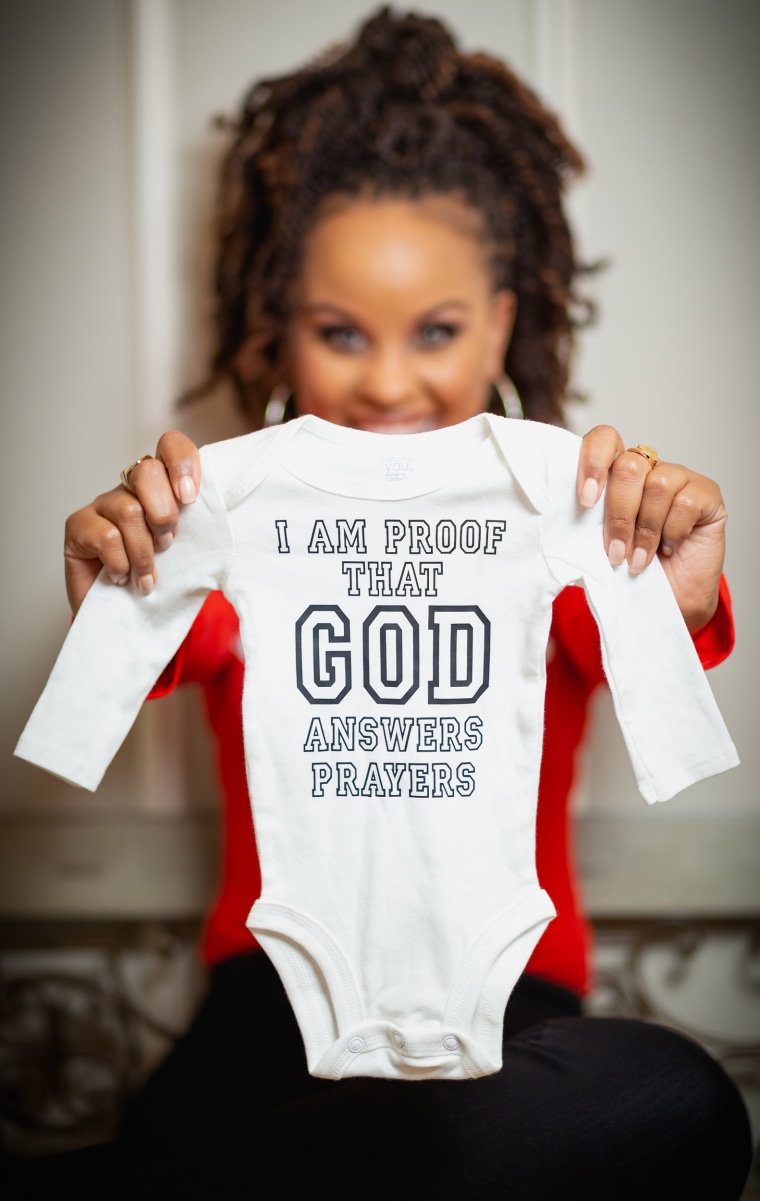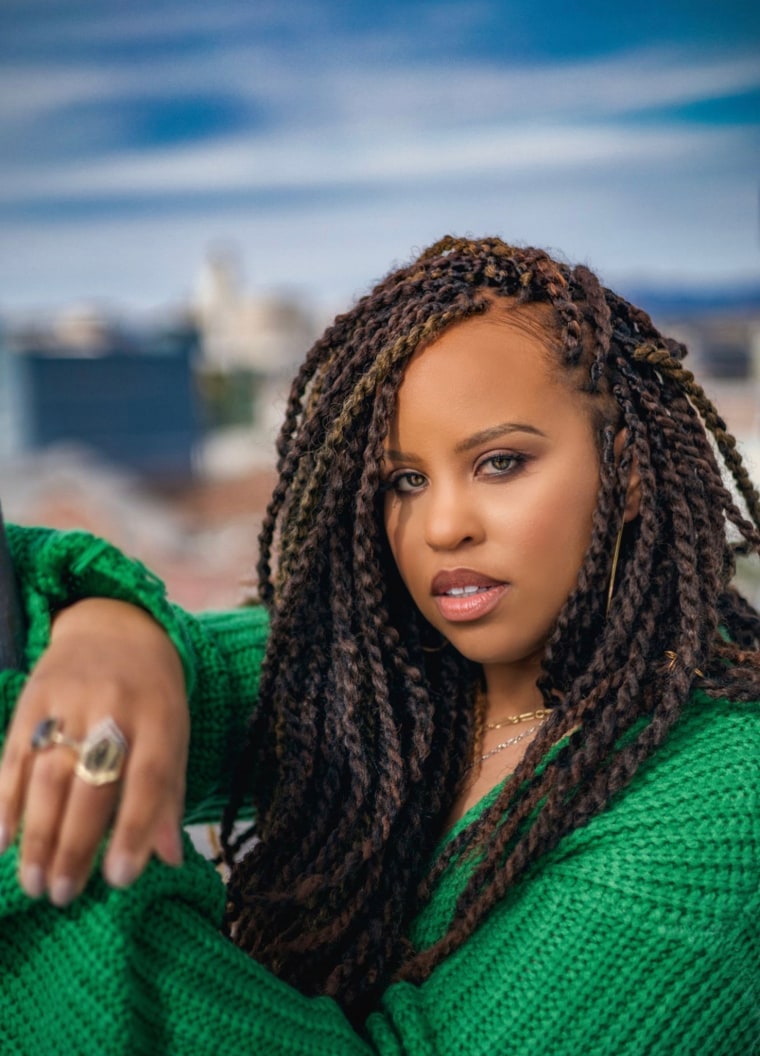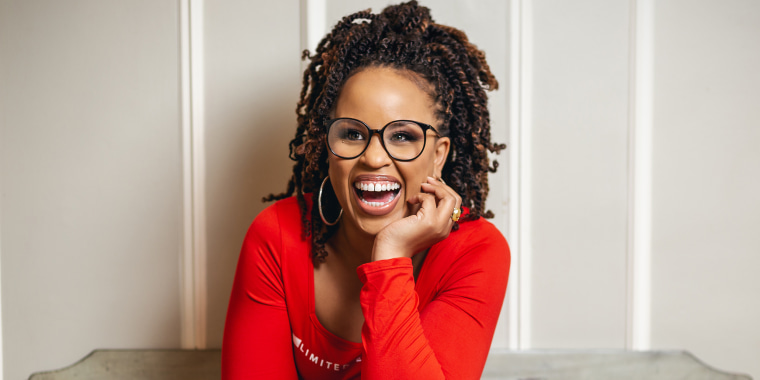Actor Kellee Stewart is known for her work in TV shows such as “Chicago Med,” “The Resident” and “Law & Order SVU,” as well as movies such as “Hot Tub Time Machine” and “Guess Who.” About nine years ago, she froze her eggs after a relationship ended. Since then she’s been outspoken about her fertility journey and encourages Black women in particular to advocate for themselves when it comes to fertility. On April 27, Stewart will light the Empire State building orange, in honor of National Infertility Awareness Week. Here, she shares her story with TODAY.
I dreamed of becoming a mother. After being in a relationship for most of my 30s, I found myself alone at 37, wondering how I’d start my family. I worried that I had dedicated my best baby-making years to the wrong relationship and it was too late. Being a woman of God, I turned to prayer, and God encouraged me to freeze my eggs. Suddenly, my grief and sadness turned into action as I made appointments at a fertility clinic to understand my health and options.
I worried that I had dedicated my best baby-making years to the wrong relationship and it was too late.
Navigating that process can feel overwhelming. People undergo a lot of tests and examinations and it might be unclear why everything happens when it does. That’s one reason why I became so candid about my fertility experience. I hoped that others could learn from what I've been through.
First, I underwent an ultrasound and blood tests to understand if I was a good candidate for egg preservation. When I learned I was, I wasted no time. Doctors’ appointments turned into crash courses on fertility. During visits, I often gleaned new information that no one had ever told me about before. It was eye-opening.

During one of my first appointments I had an ultrasound to help the doctor understand how many follicles I had. This is important because each follicle can, in theory, release an egg. Then I received blood tests to determine the levels of my anti-Mullerian hormone (AMH) and follicle stimulating hormone (FSH). All these tests helped doctors understand about how many eggs I had. Each person with ovaries are born with as many eggs as they’ll ever have. People have varying levels. I had no idea I could have been tested for this earlier, which would have led to a better understanding of my fertility. I felt relieved to learn I had a good number of follicles, which made me a good candidate for egg retrieval and preservation. Then my part began. I had to inject a medication into my abdomen for about 10 to 14 days to stimulate the egg production before receiving a trigger shot. Daily, I went to the office for blood tests and ultrasounds to make sure my follicles were responding to the medication and maturing into eggs.
In my dreams of motherhood, I had not considered starting a family like this. I thought I would fall in love, get married and start a family. But soon it started to feel empowering and I decided to make it as joyful as I could. I asked my mom to fly to spend time with me over the winter holidays while I injected myself and went for tests. She proudly shares that she was involved in the process of freezing her potential future grandchildren. While I enjoyed the process more because of her company, it was also successful and I was able to freeze 29 eggs.
Egg retrieval varies from person to person. Our bodies are all unique and the process will look a little different for each of us. Some might need to go through several cycles to get a number of eggs that seems sufficient, while others might be like me and only need one. I was lucky that at almost 38 years old I had so many viable eggs.
But even with such a successful retrieval I wish I had known about egg freezing earlier. That’s one reason why I have become so outspoken about advocating for fertility, especially among Black women. So often people don’t know that they might have problems conceiving or producing viable eggs until it is too late. Conditions such as polycystic ovary syndrome (PCOS), endometriosis and fibroids can all contribute to infertility, and Black people experience fibroids at a much higher rate than others. Having a better understanding of fertility can help people make empowered decisions.
So many people do not learn about their own fertility until it feels like a panicked situation. I don’t want people to experience that panic. I want them to feel like they can control their own future.
So many people do not learn about their own fertility until it feels like a panicked situation. I don’t want people to experience that panic. I want them to feel like they can control their own future. During the pandemic I started the Warrior Wednesday chats on Instagram Live. I’d talk with various doctors, people who experienced infertility and other experts. The response was overwhelming — so many people reached out to ask questions, suggest topics or just say thank you. Recently, we discussed male factor infertility, a topic that receives less attention even though one-third of infertility is due to male factors.
It’s also important to talk about some of the harsh realities of fertility for people of color. Black women are three times more likely to die during childbirth than white women. Women of color are more likely to have fibroids, endometriosis and other conditions that negatively impact fertility. Yet, often their pain or infertility is not taken as seriously. Sadly, racist misconceptions in medicine still exist and some believe that Black people are naturally more fertile or do not experience pain. We all need to understand bias in the medical community and advocate for all people to receive better care. I recommend that people be prepared to ask their doctor as many questions as they can. Bring an aunt, your mom or a trusted friend to help you if you feel like you need support in understanding your fertility.

Talking about fertility has become my passion and purpose. People often ask what I am going to do with my eggs and I say they’re doing enough already. They gave me the motivation to share about fertility and use my platform to help others. Without freezing my eggs nine years ago, I wouldn’t have the options and the freedom I have today and I want other people to experience this, too.
As told to Meghan Holohan. This interview had been edited and condensed.
Related video:
